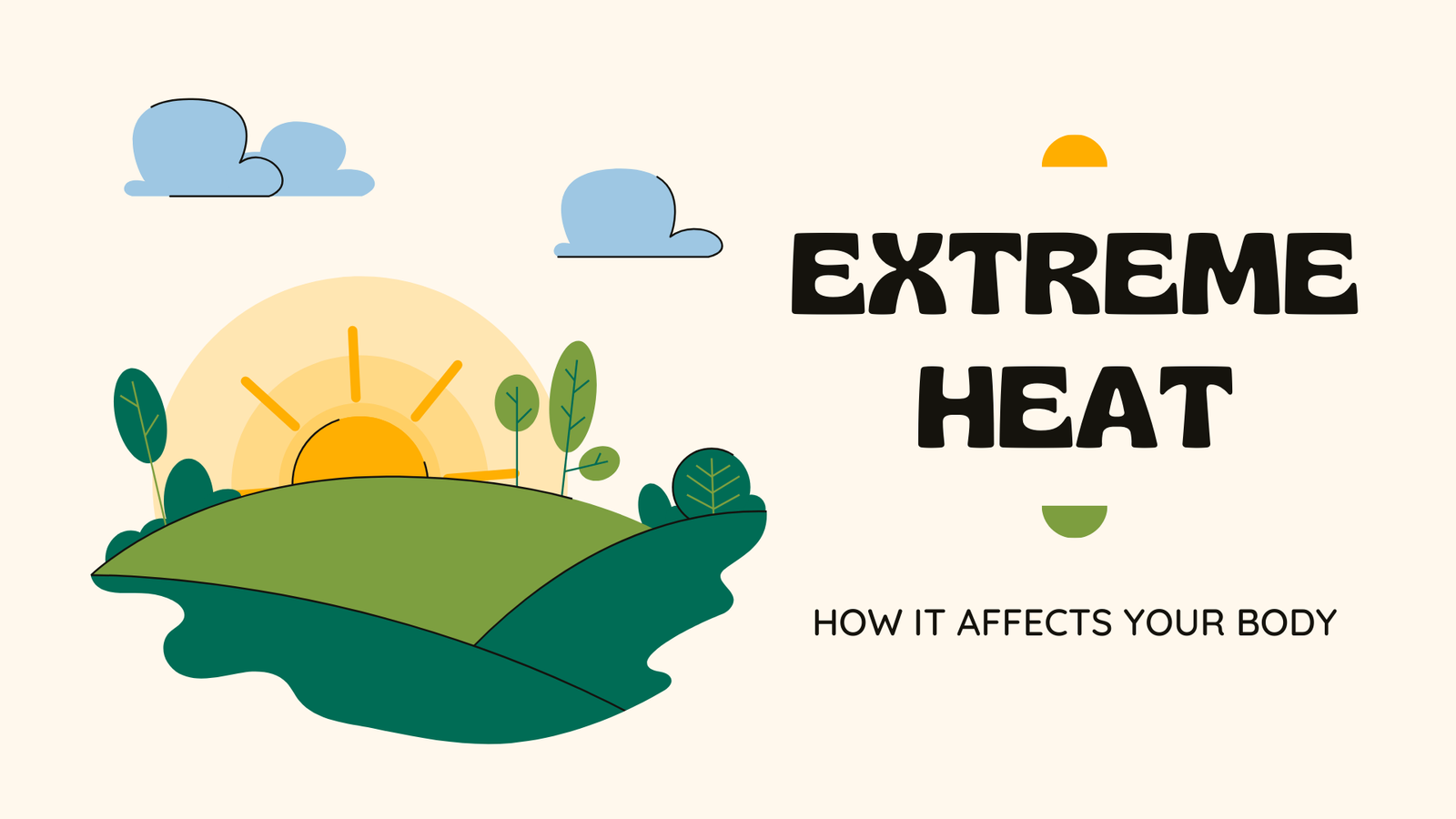“A brilliant day, hot, with a brutal staring sun pouring down rays that were like molten rain.” The famous Nella Larsen told this quote. With global temperatures on the rise, extreme heat is becoming more common. In this article, we’ll explore how extreme heat impacts your body and what you can do to stay safe.
The Future of Heat:
Imagine it’s 2050, and your morning is off to a rough start. Schools are closed due to extreme heat, and your babysitter can’t come because the train tracks have warped in the heat. Even walking your dog is dangerous because the pavement is too hot to touch. This scenario is already a reality in many parts of the world.
Increasing Heat Waves:
Heat waves are becoming more frequent, intense, and longer-lasting. According to a 2022 projection, Earth’s mid-latitudes might have extreme heat for 90 to 180 days a year, and it is going to be even more extreme in tropical regions by 2050.
How Your Body Handles Heat:
Human bodies are good at managing temperature, but our cooling mechanisms only work under the right conditions. When the air temperature rises, the hypothalamus tells blood vessels near the skin to widen, allowing more blood to flow and release heat. This process also activates sweat glands. As sweat evaporates, it cools our skin. However, high humidity can slow down or stop this evaporation.
Wet-Bulb Temperature:
Scientists use a metric called wet-bulb temperature to measure humidity. They wrap a wet cloth around a thermometer to see if evaporation lowers the reading. If it doesn’t, it’s too humid for sweat to cool us. A wet-bulb temperature of around 35°C (95°F) is generally the limit for human survival.
The Heat Index:
The US National Weather Service uses the relationship between humidity and air temperature to create the heat index. As these two metrics rise, so does the heat index. Heat is considered dangerous if the index exceeds 39.4°C (103°F). Even lower heat indexes can be hazardous over multiple days.
The Impact of Heat Waves:
A heat wave is a period of three or more consecutive days of unusually hot weather. For example, in Houston, Texas, having a string of 32°C (90°F) days is common in summer but a heat wave in March. Heat waves touch virtually every sphere of daily life.
Effects on Outdoor Workers:
During a heat wave, outdoor workers are the first to feel the effects. Excessive sweating leads to dehydration and muscle pain known as heat cramps. If they continue to work, their condition could worsen due to heat exhaustion or even heat stroke. Heat stroke occurs when the body’s temperature exceeds 40°C (104°F) and is life-threatening.
Medical Emergencies:
Heat waves cause a spike in medical emergency calls, especially for children, pregnant women, and the elderly. Hospital visits for heart, kidney, and lung-related conditions also increase, overwhelming medical providers.
City-Wide Impact:
During a heat wave, cities slow down. Schools and construction sites close, and airplanes reduce weight limits to take off, bumping travelers from flights. Restaurants shut down as kitchens become unbearable. Those with air conditioners stay safe but face high costs. If the heat continues, the stress on air conditioners can overwhelm the power grid, leading to outages.
The Deadly Consequences:
Extreme heat is deadly. Each year, nearly 500,000 people die due to excessive heat, and these extreme conditions are becoming more common. We can limit the impact by seeking help for heat-related illnesses, staying hydrated, and providing public access to water and air conditioning.
Conclusion:
Extreme heat is a growing problem that affects our way of life. It’s crucial to take steps to stay safe and ease the impacts of heat waves. Small temperature increases can have significant effects on our health and daily activities. Stay informed, stay cool, and take care of your body during extreme heat.
FAQs:
1. What is a heat wave?
A period of unusually hot weather lasting two or more days.
2. How does the body cool itself?
By widening blood vessels near the skin and activating sweat glands.
3. What is wet-bulb temperature?
A metric to measure humidity and the cooling effect of evaporation.
4. What is heat stroke?
A life-threatening condition where the body’s temperature exceeds 40°C (104°F).
5. How do heat waves affect cities?
They slow down daily activities, close schools and construction sites, and cause power outages.
6. How can we stay safe during extreme heat?
Stay hydrated, seek help for heat-related illnesses, and access public water and air conditioning.
